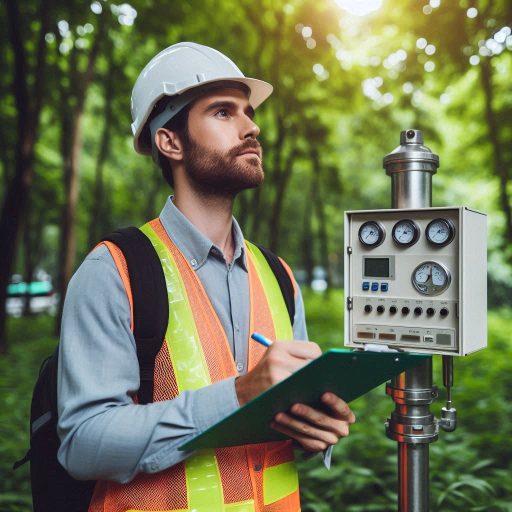Introduction
Environmental technicians play a critical role in monitoring and protecting the environment.
They collect samples, conduct tests, and analyze data to assess environmental conditions.
Their work ensures that businesses and governments comply with environmental regulations and contribute to sustainable practices.
Environmental technicians are essential in preventing pollution and mitigating environmental hazards.
In today’s world, the importance of environmental technicians has never been greater.
With increasing awareness of climate change, pollution, and resource depletion, their expertise is vital.
Technicians help industries minimize their environmental impact and support efforts to preserve natural resources.
Their work directly influences public health and environmental quality, making them key players in global sustainability efforts.
The demand for environmental technicians is rising rapidly.
As regulations become stricter and environmental concerns grow, more industries need skilled technicians to ensure compliance.
Emerging fields like renewable energy and environmental consulting also contribute to this demand.
Technological advancements in environmental monitoring and data analysis are creating new opportunities for technicians to expand their skill sets.
This blog post will explore the future outlook for environmental technician careers.
It will discuss the growing importance of their role, the factors driving increased demand, and the opportunities for career advancement in this evolving field.
Education and Training Requirements
Background for Environmental Technicians
To become an environmental technician, you need a solid educational background.
Most technicians start with an associate degree in environmental science, biology, or a related field.
Some may pursue a bachelor‘s degree for more advanced roles and responsibilities.
Coursework typically includes environmental science, chemistry, and geology.
This foundational knowledge equips you with the understanding necessary for analyzing and managing environmental issues.
In addition to formal education, focus on acquiring practical skills.
Programs often include laboratory work and field studies, which provide hands-on experience.
This practical training helps you apply theoretical knowledge to real-world situations, enhancing your problem-solving abilities and technical expertise.
Importance of Hands-On Training and Experience
Hands-on training is crucial for a successful career as an environmental technician.
Practical experience allows you to develop skills in using specialized equipment and conducting fieldwork.
This experience is essential for performing tasks such as sampling air, water, and soil, and interpreting data accurately.
Internships or entry-level positions offer valuable opportunities to gain field experience.
They allow you to work alongside experienced professionals, learn industry practices, and understand the daily responsibilities of an environmental technician.
Practical experience also helps build your resume and prepares you for advanced certifications and career progression.
Certifications and Licenses
Certifications and licenses are often required for environmental technicians.
They demonstrate your expertise and commitment to industry standards.
For example, the Occupational Safety and Health Administration (OSHA) provides certification for handling hazardous materials safely.
Additionally, the American Association for Laboratory Accreditation (A2LA) offers certifications for laboratory professionals.
Some states or employers may require specific licenses related to environmental testing and compliance.
It is essential to research the requirements in your area or industry to ensure you meet all necessary qualifications.
Earning these certifications and licenses enhances your credibility and can improve job prospects.
Future Career Prospects
As environmental concerns grow, the demand for skilled environmental technicians is likely to increase.
Technicians will play a critical role in addressing environmental challenges, such as climate change and pollution control.
By maintaining a strong educational background, gaining hands-on experience, and obtaining relevant certifications, you can position yourself for a successful and rewarding career in this field.
Becoming an environmental technician requires a relevant educational background, hands-on training, and necessary certifications.
Practical experience enhances your skills and prepares you for advanced roles.
Certifications and licenses validate your expertise and improve career prospects, ensuring you are well-prepared for future opportunities in environmental technology.
Read: Online Courses for Surveying and Mapping Technicians
Job Duties and Responsibilities
Typical Tasks and Responsibilities
Environmental technicians perform a range of tasks focused on protecting and improving environmental conditions.
They conduct site assessments to evaluate environmental quality and compliance with regulations.
Technicians collect and analyze samples of air, water, and soil to monitor pollution levels.
They also inspect equipment and facilities to ensure adherence to environmental standards.
Developing and implementing pollution control measures is another key responsibility.
Technicians prepare detailed reports and documentation of their findings, providing critical data for decision-making.
Areas of Employment
Environmental technicians work in various sectors, each offering unique opportunities and challenges.
Government agencies employ technicians to enforce environmental regulations and conduct research.
These roles often involve fieldwork and policy development.
Consulting firms hire technicians to advise businesses on environmental compliance and sustainability practices.
They provide expertise on managing environmental risks and implementing best practices.
Non-profit organizations also employ technicians to support conservation projects and environmental advocacy.
These positions often focus on public education and community outreach.
Importance of Attention to Detail
Attention to detail is crucial for environmental technicians.
Their work requires precise measurements and accurate data collection.
Small errors can lead to significant consequences, such as compliance issues or environmental damage.
Technicians must carefully document their findings and ensure that all data is reliable.
Attention to detail helps prevent mistakes that could undermine environmental protection efforts.
It also ensures that reports and recommendations are based on accurate information.
Role of Critical Thinking Skills
Critical thinking skills are essential for environmental technicians.
They must analyze complex data and interpret results to identify environmental issues.
Technicians need to evaluate different solutions and choose the most effective strategies for problem-solving.
This involves assessing potential risks and benefits of various approaches.
Critical thinking helps technicians adapt to changing conditions and unexpected challenges.
It also supports innovative approaches to environmental management and sustainability.
Future Outlook for the Profession
The future outlook for environmental technician careers is promising.
Growing awareness of environmental issues and stricter regulations increase the demand for skilled technicians.
Technicians will continue to play a key role in monitoring and improving environmental conditions.
Advancements in technology will also shape the profession, offering new tools and methods for data collection and analysis.
The need for attention to detail and critical thinking will remain central to the role, as technicians tackle evolving environmental challenges.
Read: Surveying and Mapping Technician: Job Satisfaction
Salary and Job Outlook
- Environmental technicians earn an average salary range of $40,000 to $60,000 per year.
- Job growth rate for environmental technician careers is projected to be faster than average at 8%.
- Factors like governmental regulations and funding can impact job opportunities in the environmental technician field.
As environmental awareness continues to grow, the demand for environmental technicians is expected to rise steadily.
This trend is driven by the need for environmental protection and sustainable practices across various industries.
Overview of the Average Salary Range for Environmental Technicians
Environmental technicians typically earn salaries that range from $40,000 to $60,000 per year, depending on factors such as location, level of experience, and specific job responsibilities.
Entry-level positions may start at the lower end of the salary range, while experienced professionals with advanced certifications or specialized skills can earn salaries at the higher end of the spectrum.
It is important to note that the field of environmental technology is diverse, with opportunities available in areas such as air quality monitoring, water quality assessment, waste management, and environmental compliance.
Salaries may vary based on the specific focus of the technician’s work and the industry in which they are employed.
Analysis of the Job Growth Rate for Environmental Technician Careers
The job growth rate for environmental technician careers is projected to be faster than average, with an estimated growth rate of 8% over the next decade.
This growth is attributed to several factors, including increased environmental regulations, the expansion of green technologies, and the growing focus on sustainability in business practices.
As companies and government agencies strive to meet environmental standards and reduce their carbon footprint, the demand for skilled environmental technicians is expected to increase.
Environmental technicians play a crucial role in helping organizations comply with regulations, implement sustainable practices, and assess environmental risks.
Mention of Factors that May Impact Job Opportunities in the Field
While job prospects for environmental technicians are generally positive, there are certain factors that may impact job opportunities in the field.
Changes in government regulations, budget cuts, and fluctuations in funding for environmental programs can influence the demand for environmental technicians.
Additionally, advancements in technology and automation may affect the nature of environmental technician roles .
Requiring professionals to stay current with emerging trends and develop new skills to remain competitive in the job market.
Specialized certifications and training in areas such as data analysis, GIS mapping, and environmental modeling can enhance job prospects and open up new opportunities for advancement in the field.
The future outlook for environmental technician careers is promising, with steady job growth and opportunities for professional development.
By staying informed about industry trends, acquiring relevant skills and certifications, and demonstrating .
Commitment to environmental stewardship, environmental technicians can position themselves for success in this rewarding and impactful field.
Read: Field vs. Office Work in Surveying and Mapping

Advancement Opportunities
Potential Career Advancement Paths for Environmental Technicians
Environmental technicians have promising career advancement paths as the field evolves.
With experience and additional qualifications, they can explore various career opportunities.
Understanding these paths helps technicians plan their career progression effectively.
Additional Certifications and Specialized Training
Obtaining additional certifications can significantly enhance career prospects.
Certifications such as Certified Environmental Professional (CEP) or Certified Environmental Technician (CET) open doors to higher-paying positions.
These certifications validate expertise and increase job competitiveness.
Specialized training in areas like hazardous materials management or environmental impact assessments can also lead to advancement.
Technicians can pursue courses or workshops offered by professional organizations.
This specialized knowledge is valuable for roles requiring specific skills and expertise.
Engaging in advanced degrees, such as a master‘s in environmental science or engineering, further boosts career opportunities.
Higher education enhances qualifications and prepares technicians for complex roles.
It also positions them for leadership roles within the field.
Managerial and Supervisory Roles
With experience, environmental technicians can transition into managerial or supervisory roles.
These positions involve overseeing teams, managing projects, and ensuring compliance with regulations.
Managers and supervisors play a key role in coordinating efforts and driving project success.
Roles such as Environmental Project Manager involve handling larger projects and coordinating with various stakeholders.
This position requires strong leadership skills and extensive knowledge of environmental regulations.
It offers higher salaries and greater responsibilities compared to technician roles.
Supervisory roles, such as Environmental Services Supervisor, involve managing a team of technicians.
Supervisors ensure that work is performed according to standards and regulations.
They also handle administrative tasks and provide training and support to team members.
Transform Your Career Today
Unlock a personalized career strategy that drives real results. Get tailored advice and a roadmap designed just for you.
Start NowRead: Top Surveying and Mapping Technician Employers
Gain More Insights: Human Factors in Industrial Engineering
Technological Advancements in the Field
How Technology Is Changing Environmental Technician Work
Technology is revolutionizing the work of environmental technicians.
Advances in tools and systems are reshaping how they monitor and analyze environmental conditions.
This transformation enhances the efficiency and accuracy of their work, leading to more effective environmental management.
Use of Drones in Environmental Monitoring
Drones have become essential tools for environmental monitoring.
They provide aerial views of large areas, making it easier to assess environmental conditions.
Drones capture high-resolution images and collect data on vegetation, land use, and pollution sources.
This capability allows technicians to monitor hard-to-reach areas and gather comprehensive data quickly.
Drones also support various applications, such as tracking wildlife, surveying ecosystems, and assessing environmental damage.
Their versatility makes them valuable assets in many environmental projects.
Technicians use drones to gather detailed information that informs conservation efforts and regulatory compliance.
GIS Mapping for Enhanced Analysis
Geographic Information Systems (GIS) mapping is another critical technology for environmental technicians.
GIS software allows technicians to visualize and analyze spatial data.
They create detailed maps that illustrate environmental features, pollutant sources, and changes over time.
GIS mapping helps technicians make data-driven decisions.
By integrating various data layers, technicians can identify patterns and trends that are not immediately visible.
This analysis supports more accurate environmental assessments and effective planning for sustainability initiatives.
Other Technological Tools and Innovations
Technicians also utilize advanced sensors and data logging devices for environmental monitoring.
These tools measure air and water quality, capturing data with high precision.
Real-time data collection and analysis help in identifying pollution sources and tracking environmental changes promptly.
Mobile applications designed for field data collection streamline the process.
These apps allow technicians to record observations, take photos, and input data directly from the field.
They enhance efficiency and accuracy, ensuring that data is readily available for analysis and reporting.
Importance of Staying Up-to-Date with Technological Advancements
Staying up-to-date with technological advancements is crucial for environmental technicians.
Technology evolves rapidly, and new tools and methods continually emerge.
Keeping current with these advancements ensures that technicians remain effective and competitive in their roles.
Ongoing education and training in new technologies help technicians adapt to changes in the field.
They can leverage the latest tools to improve their work processes, enhance data accuracy, and address emerging environmental challenges.
Technicians who stay informed about technological trends are better positioned to contribute to successful environmental management and sustainability efforts.
Technology is significantly changing how environmental technicians work.
Drones, GIS mapping, and advanced sensors are transforming environmental monitoring and analysis.
Staying up-to-date with these technological advancements is essential for maintaining effectiveness and supporting successful environmental outcomes.
Environmental Technician Careers in Different Industries
Diverse industries that employ environmental technicians
Environmental technicians work in a variety of industries, showcasing their versatility and the broad application of their skills.
These technicians are not limited to traditional environmental roles but are also integral to several other sectors.
Their expertise in managing and mitigating environmental impacts is valued across different fields.
Unique Roles and Responsibilities in Various Sectors
Healthcare
In the healthcare sector, environmental technicians ensure that facilities meet environmental standards for safety and cleanliness.
They manage waste disposal, particularly hazardous medical waste, and ensure compliance with health regulations.
Technicians monitor and maintain safe air and water quality levels within healthcare facilities, contributing to patient safety and regulatory compliance.
Construction
In construction, environmental technicians play a key role in managing environmental impacts associated with building projects.
They monitor soil and water quality during excavation and construction activities.
Technicians also ensure compliance with environmental regulations related to construction site runoff, waste management, and pollution control.
Their work helps minimize the ecological footprint of construction projects.
Energy
The energy sector employs environmental technicians to oversee environmental impacts associated with energy production and consumption.
They monitor emissions, manage waste products, and ensure compliance with environmental regulations.
Technicians also work on projects related to renewable energy sources, helping to reduce the environmental impact of traditional energy methods and promoting sustainable practices.
Transferable Skills for Different Industries
Environmental technicians bring several transferable skills that are valuable across various industries. These skills include:
- Analytical Skills: Technicians analyze environmental data, a skill that is useful in any sector requiring data-driven decision-making.
- Problem-Solving Abilities: They develop solutions for environmental issues, a capability applicable to resolving challenges in other fields.
- Technical Expertise: Familiarity with environmental technologies and monitoring equipment can be leveraged in sectors that use similar tools.
- Regulatory Knowledge: Understanding and interpreting regulations is beneficial for compliance roles in various industries.
- Project Management: Experience in managing environmental projects translates to effective project management in other sectors.
- Communication Skills: Technicians often need to convey complex information clearly, a skill valuable in any industry requiring stakeholder communication.
Find Out More: Emerging Technologies in Computer Engineering
Conclusion
This blog post has examined the promising future for environmental technician careers.
We discussed the growing demand for technicians as environmental concerns increase.
Technicians will play a crucial role in addressing climate change, managing resources, and ensuring regulatory compliance.
Technological advancements are driving the field forward, offering new tools and methods for environmental management.
The integration of data analytics, remote sensing, and green technologies enhances job effectiveness and opens up innovative career paths.
The focus on sustainability and environmental protection continues to expand, creating more opportunities for skilled technicians.
The future outlook for environmental technician careers is bright, with ample growth potential and diverse career options.
As industries and governments prioritize environmental issues, the need for qualified technicians will rise.
This trend indicates a stable and rewarding career path for those in the field.
For individuals interested in this field, now is an excellent time to pursue opportunities.
Seek out educational programs, certifications, and internships to build a strong foundation.
Engage in continuous learning to stay updated on emerging technologies and industry trends.
The career outlook for environmental technicians is highly promising.
Embrace the opportunities for growth and advancement, and be part of a vital field dedicated to protecting our environment.
Your future in environmental technology holds significant potential for impact and success.
[E-Books for Sale]
The Big Book of 500 High-Paying Jobs in America: Unlock Your Earning Potential
$19.99 • 500 High-Paying Jobs • 330 pages
Explore 500 high-paying jobs in America and learn how to boost your career, earn more, and achieve success!
See All 500 High-Paying Jobs of this E-Book
1001 Professions Without a Degree: High-Paying American Jobs You Can Start Now
$19.99 • 1001 Professions Without a Degree • 174 pages
Discover 1001 high-paying jobs without a degree! Unlock career tips, skills, and success strategies for just $19.99!




